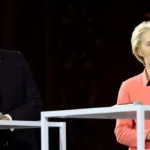
UK Eases Electric Vehicle Transition to Shield Auto Sector from US Tariffs
In response to newly imposed US tariffs, the UK government has announced a significant shift in its electric vehicle (EV) transition policy. Prime Minister Keir Starmer’s Labour administration is pushing back the ban on hybrid vehicle sales to 2035—five years later than initially planned. This decision comes as part of a broader effort to support the British auto industry, which is grappling with a 25% tariff on car exports to the US.
The changes include more lenient rules for automakers failing to meet the mandated production quota for electric vehicles. Companies will no longer be required to purchase credits from fully electric manufacturers like Tesla or BYD to offset shortfalls in their EV output. Additionally, financial penalties for non-compliance have been reduced by 20%, from £15,000 to £12,000 per vehicle.
Support for Key Industry Players
In a visit to Jaguar Land Rover’s (JLR) manufacturing facility, Starmer acknowledged the economic challenges the country faces due to the tariffs. “No one is pretending that these tariffs are good news,” he said. “But we are here to say: we will support you all the way.”
Starmer was joined by Chancellor Rachel Reeves, underlining the Labour government’s commitment to protecting a sector that employs over 152,000 people and contributes £19 billion annually to the UK economy. Luxury brands like Aston Martin, Bentley, and McLaren are also receiving special allowances—being permitted to continue manufacturing internal combustion engine (ICE) vehicles beyond the 2030 deadline set for the broader industry.
Read Also: ‘Absolutely perverse’: climate scheme could reward Australian coalmines while emissions rise
Incentives Amid Criticism
To counteract environmental backlash, the government has paired these regulatory relaxations with incentives aimed at accelerating EV adoption. These include tax cuts on EV purchases and a substantial investment of £2.3 billion into expanding the country’s EV charging infrastructure.
Environmental groups and the Green Party have criticized the move, accusing the Labour government of backtracking on its climate commitments. Despite this, officials argue the delay will have a minimal impact on the UK’s overall emissions trajectory, stressing that their long-term goal of a green transition remains intact.
Navigating a Volatile Global Trade Environment
The shift in policy comes at a time of great global economic uncertainty. The US, under President Donald Trump, has slapped not only the UK but other nations with high import tariffs—25% on vehicles and 10% on various goods. Starmer, however, has chosen not to retaliate immediately, instead maintaining a strategic approach aimed at reaching a beneficial trade deal with the US.
“We won’t sign just any agreement—we want one that benefits the British people,” Starmer declared, while also emphasizing the UK’s intent to diversify its trade relations. Talks are ongoing with countries like India and Australia to create new free trade opportunities.
A Strategic Pause, Not a Policy Reversal
“This is a rapidly changing world,” Starmer noted. “Old assumptions no longer apply. We will stay calm and fight for the best possible deal with the US while also working with our global partners to lower trade barriers.”
The UK government’s move to slow down its EV transition is thus not a rejection of green goals, but a calculated adjustment aimed at preserving industrial competitiveness during turbulent times. Whether this strategy will succeed in balancing climate priorities with economic realities remains to be seen.
This post is originally published on : elperiodico





